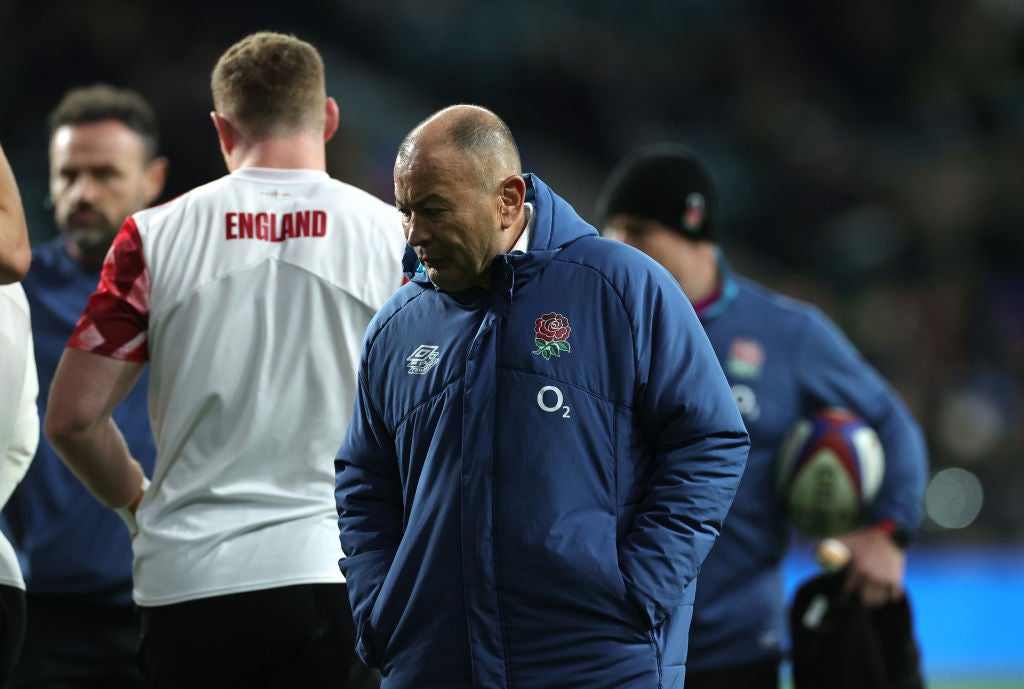
The grim memories of 2019 came flooding back into English heads, carried in the crush of the green South African wave. So much for the banishment of the dark recollections of that chastening night.
Eddie Jones had identified ahead of the game three key battlegrounds at which matching the accuracy and intent of the opposition would be non-negotiable for his side: the scrum, the maul, and in the air. At each, England were thoroughly, thoroughly beaten - bodies and minds contused again by the familiar blunt trauma of the Springboks.
“We’re not off track,” insisted Jones, even after what looked another significant step backwards. “You have days like that. I’ve had worse days than that. We felt really confident going into the game. We knew where South Africa were coming, but on the day we weren’t good enough to win those areas.”
Survey the scars of battle – Kyle Sinckler’s sore hip, Will Stuart’s elbow, Mako Vunipola bent double – and it was clear that England had been brutalised at the set piece. With great booming echoes of that final dismantling three years ago, here was a reminder of the power South Africa possess, even without as many as seven potential first choice starters in their ranks.
England’s only try came after Thomas du Toit had been sent off and with Faf de Klerk down injured.
For all that South Africa forwards held sway, when Kurt-Lee Arendse danced up the right, it was the blade, not the bludgeon, that opened England up, brightening a contest that had until then been drab.
Owen Farrell and Freddie Steward, often England’s Messrs dependable, set an oddly error-prone tone with misses from the tee and aerial mishaps. Jonny Hill and Alex Coles, two of the new faces since the final defeat, struggled for discipline; a pre-planned half-time switch of front rows failed to stabilise England’s crumbling edifice. The failure to match the Springboks’ scrum eroded their foundations but cannot, surely, entirely excuse England’s mistakes elsewhere?
Jones disagreed. “There is one thing about rugby that has not changed - if you can’t win the scrum, you can’t win the game. It’s hard to judge other parts of your game when you get beaten at the scrum like that.
“I have grave concerns about how the scrum was refereed today. But that’s part of the deal, isn’t it? You’ve got to live with that. One of the things I have learned about coaching is you have to find the major problem, and the major problem today was the scrum. How do we fix the scrum if we have that referee again and he’s going to referee like that? That’s the only thing I worry about.”
So while South Africa exit the autumn with their place as World Cup contenders clear, another English inquest begins. They reach the end of their first losing autumn under Jones, closing their least successful calendar year since 2008. Signs of real, sustained progress are still not apparent. The five wins in 2022 have come against Italy, Wales, Australia and Japan; when England are matched physically, they appear to have few answers.
Of course the Australian, like all coaches, is holding things back for the World Cup year but the identity crisis continues.

Perhaps the “unpredictable” attack will come together as trailed eventually, but it is now more than a year since Martin Gleeson’s installation and the promised varied shapes are still no closer to forming with any sort of consistency.
Brett Hodgson arrives as the new defence coach entirely untried in rugby union, and a few senior figures in the squad may be nearing the end of their time as effective international players. There are now only nine games left before the tournament in France to instil a belief and strategy that enables England to mix it with the world’s best four teams.
Jones is braced for more “uncomfortable” discussions over the next fortnight with the Rugby Football Union’s review panel. As things stand the composition of this group of evaluators will again not be disclosed but, after this latest bruising defeat, the faceless appraisers have plenty to mull.







